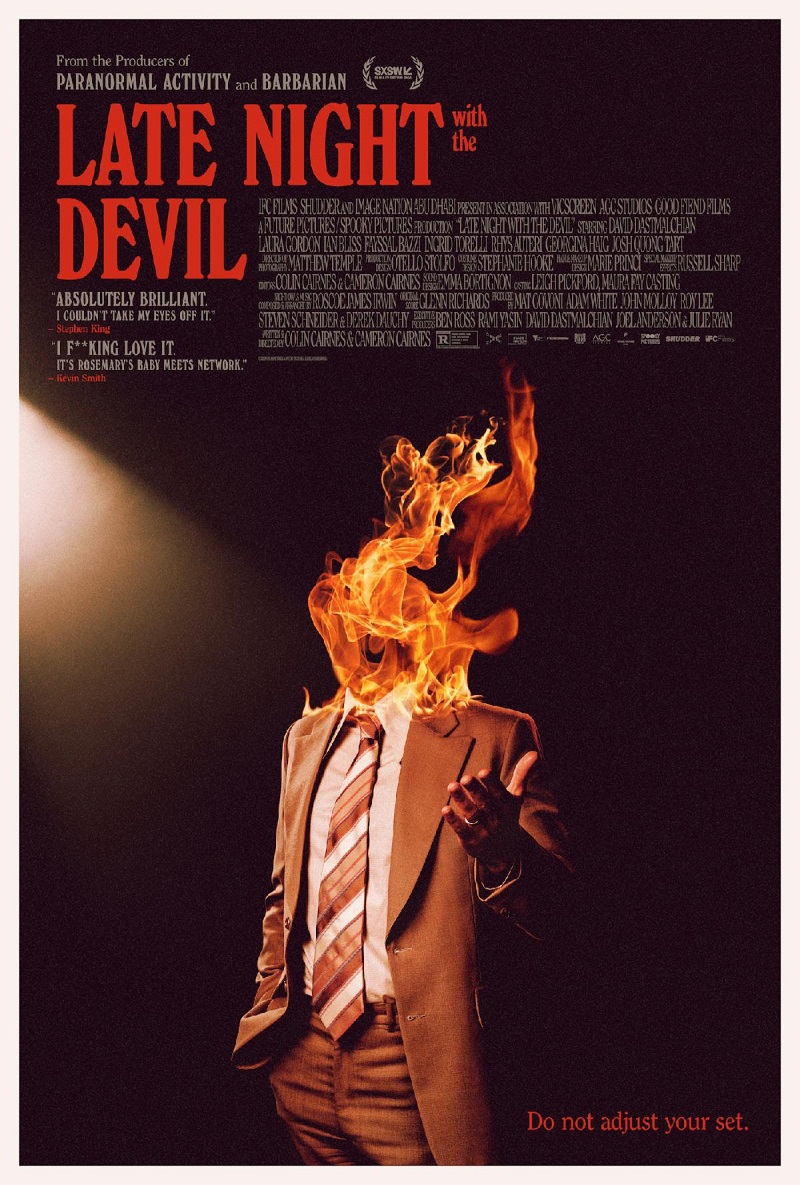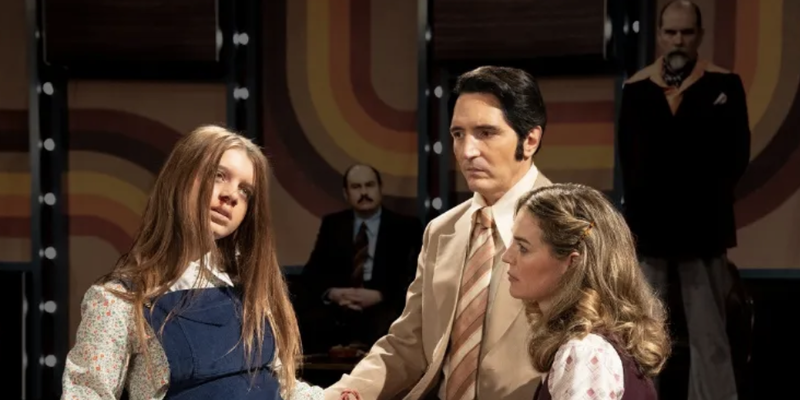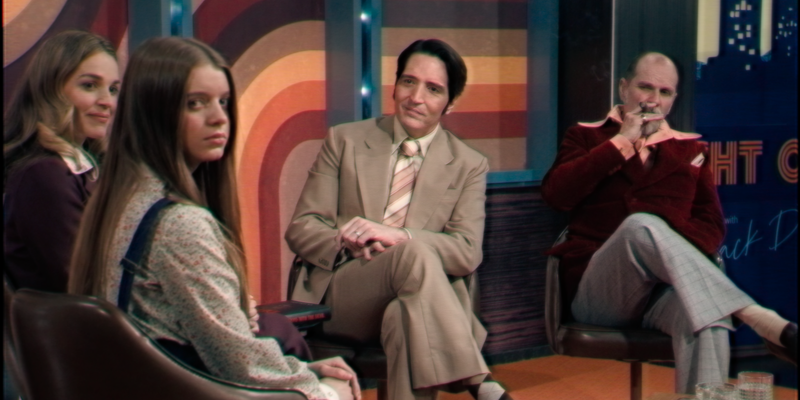
Review by
Eric Hillis
Directed by: Colin Cairnes, Cameron Cairnes
Starring: David Dastmalchian, Laura Gordon, Ian Bliss, Ingrid Torelli, Fayssal Bazzi, Rhys Auteri

An Australian horror movie posing as an American chat show,
Late Night with the Devil harks back to a very British
tradition, that of the fake TV show. Think of Alternative 3, Ghostwatch and that infamous Paul Daniels Halloween
special in which the magician faked his own death live on air. Of
course, the audiences for those notorious productions had no prior
knowledge that they were about to be taken for a ride. Few will be
similarly fooled by Cameron and Colin Cairnes' film, but
they'll certainly be entertained, especially those viewers old enough to
remember the sort of TV history the writer/director brothers are
referencing here.
The Aussie siblings previously explored the idea of unscrupulous
content producers crossing lines for ratings with their 2016 film
Scare Campaign. With Late Night with the Devil they're taking the same
idea and giving it a retro spin by taking us back to the golden age of
the talk show, the 1970s.

A Michael Ironside narrated opening prologue fills us in on the
back story of Jack Delroy (David Dastmalchian), the host of a
late night talk show ("Night Owls") who found himself constantly lagging
behind Johnny Carson throughout the '70s. We're told that Delroy may
have been involved with a cult, but little was thought of it in that
pre-Satanic Panic era where celebs were happy to be photographed hanging
out with the likes of Church of Satan founder Anton LaVay. When Delroy's
wife Madeleine (Georgina Haig) succumbs to terminal cancer, he
invites her onto Night Owls just weeks before her passing, resulting in
record viewing numbers that still fall short of Carson. Following
Madeleine's passing, Delroy takes some time off but eventually returns
to a show that is struggling to stay on the air.
Late Night with the Devil then informs us that what we're
about to see is constructed from a combination of the transmission of
the October 31st, 1977 edition of Night Owls and behind the scenes
footage filmed on that fateful night.
Delroy has a special Halloween lineup consisting of Christou (Fayssal Bazzi), a melodramatic psychic; Carmichael Haig (Ian Bliss), a
magician and professional skeptic, clearly modelled on James Randi,
right down to his standing offer of a cash sum for anyone who can prove
the existence of the supernatural; and Dr. June Ross-Mitchell (Laura Gordon), a psychiatrist accompanied by her most infamous patient, 13-year-old
Lilly D'Abo (Ingrid Torelli), the sole survivor of a mass suicide
conducted by her father's cult.

The night begins with Christou initially stumbling in his attempts to
contact the dead live on air, until he claims to communicate with an
audience member's late husband. There doesn't appear to be any trickery
afoot, but Haig dismisses it as smoke and mirrors, even when Christou is
rushed to hospital after suffering a fit of convulsions and projectile
vomiting. The ratings really start to rise however when Delroy brings
out June and Lilly, the latter of which claims to be possessed by a
demon. At Delroy's urging, June reluctantly agrees to tempt the demon to
appear before a studio audience. It's at this point that all Hell
literally breaks loose.
Like no other genre, horror offers meaty lead roles to character actors
and those who aren't blessed with conventional movie star looks. A
classic "that guy," Dastmalchian has appeared in small roles in movies
for directors like Christopher Nolan, James Gunn and Denis Villeneuve,
but his screen time is usually severely limited or he's buried under
makeup. With Jack Delroy he's finally given the chance to inhabit a lead
role, and he's excellent in channeling the unique persona of the classic
American talk show host, a curious mix of smarm, charm and insecurity.
You can see a lot of Dick Cavett in his mannerisms, but also of Garry
Shandling's fictional creation Larry Sanders, constantly betraying his
nerves and apprehension by straightening his tie. The influence of
The Larry Sanders Show extends to Delroy's sidekick Gus
(Rhys Auteri), who with his mustache and sides combo is clearly
modelled on Jeffrey Tambor's Hank Kingsley. The Australian supporting
cast does a great job of not only convincing us that they're Americans,
but that they're 1970s Americans. Gordon is a standout, and it will be
no surprise if she becomes the next Aussie actress to crack
Hollywood.

The evocation of '70s TV is spot-on, with garish set design and era
specific intertitles. Even the kitschy yet funky music played by
Delroy's house band sounds just right. There's an undercurrent of
seediness to the whole thing, and you wouldn't want to examine Delroy's
stage under a black light for fear of what you might uncover.
Late Night with the Devil pulls you into its meticulously
recreated world from the off and keeps you gripped up to a point. Things
go off the rails in the final act in both a good way, with an explosive
climax utilising vintage FX, and in a not so good way, with a bit of
business involving Carmichael playing a trick that takes us out of the
moment by explicitly reminding us we're watching a movie rather than the
footage of a real event. It's difficult to find your way back into the
conceit after that misjudged moment, which is a shame as up to that
point Late Night with the Devil makes a compelling case
for becoming a future Halloween classic.


